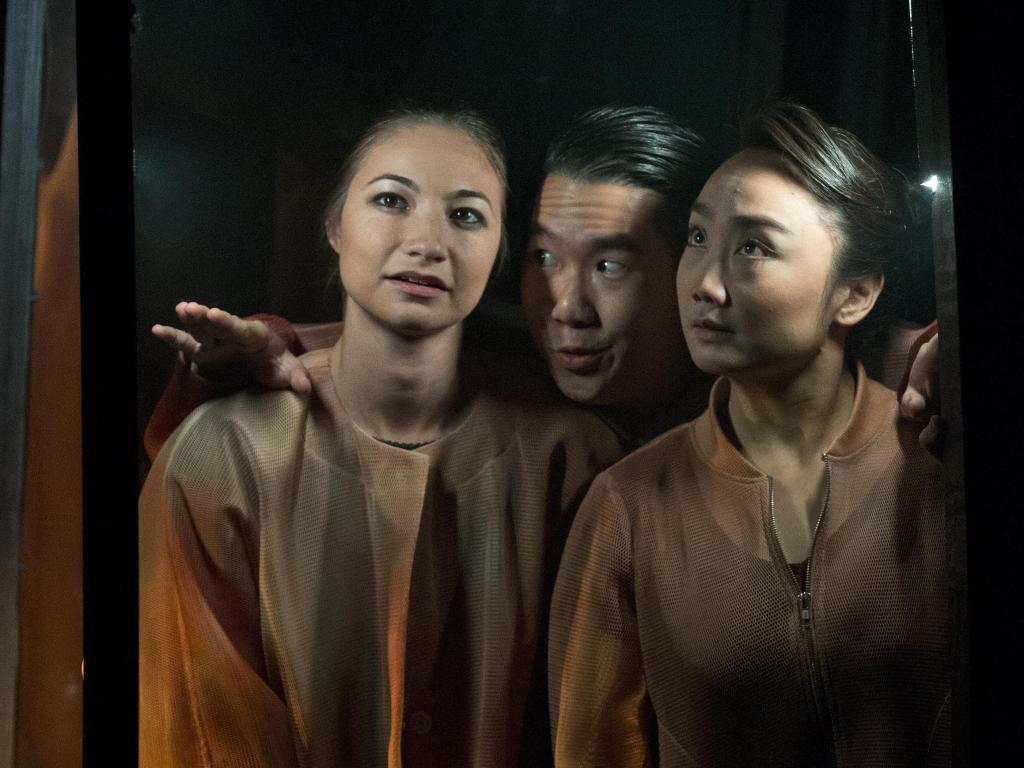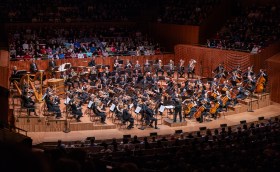Emina Ashman, Bernard Sam, Jing-Xuan Chan in Hungry Ghosts photo by Jeff Busby.
At the centre of Hungry Ghosts’ complex orbits is the story of modern movement, an individual caught between a native home that rejects part of who they are and an adopted home where they find it difficult to find complete belonging. In this schizoid state of being, events connected to one or both homes can become symbolic, even prophetic, but the machinations of the powerful and headline-making tragedies, as close as they may feel are opaque lenses through which to make sense of a disquieting world.
In this world it is a Malaysian student in Australia discovering a sexual identity that they were forced to keep hidden against the backdrop of MH370 and the 1MDB scandal that keep the home they left uncomfortably close.
There is always a risk in blending fact and fiction, particularly when the facts in question are both disputed and incomplete. If reality is not a fixed reference point then where do you ground the narratives?
Hungry Ghosts moves between three major narrative streams, that of the student, a Greek-chorus eque commentary on the life of Prime Minister Najib Razak and a comedic direct address explaining the complex facts of the real events. It’s a bold and novel approach to explore such varied and separate stories between which the connections are jagged and instinctive. It cleverly aims to mirror the rapid pull of emotion but this liquidity comes at the cost of occasional disorientation and while this isn’t inherently a bad thing, there were times where it took a few moments to realise exactly in which stream the audience had arrived.

Bernard Sam, Jing-Xuan Chan, Emina Ashman in Hungry Ghosts photo by Jeff Busby.
Grand narratives can sometimes overpower intriguing smaller parts and in Hungry Ghosts it’s the journey of the student that would have been wonderful to see more of, to delve deeper into her conflict, her divergent lives and the families that each home offered. Hungry Ghosts has all the components for something extraordinary but the whole ends up being slightly less than the some of its parts.
The suspended bodies of the crash victims was a bit of brilliant visceral artistry, the Wolf of Wall Street samples a clever link and the frustrated and grieving families a dramatic high-point but they never quite gelled until the very end. Tong’s subtle wit managed to draw out the immateriality and moral neutrality of memory that tied all the strands together. The enduring notion of disappearance, be it of scandal, love, parts and the whole of people, the little voices inside one’s head or the unheard voices that surround us, was an unexpected and impressive insight. All that disappears would make for hungry ghosts indeed.
Rating: ★★★☆
Hungry Ghosts by Jean Tong
MTC, Southbank Theatre, The Lawler
3-19 May 2018
Regional Tour
22 May – 7 June
Bendigo, Mildura, Geelong, Launceston, Wangaratta and Sale
Cast: Emina Ashman, Jing-Xuan Chan, Bernard Sam
Director: Petra Kalive
Set Designer: Eugyeene The
Costume Designer: Sophie Woodward
Lighting Designer: Emma Valente
Composer and Sound Designer: Darius Kedros





